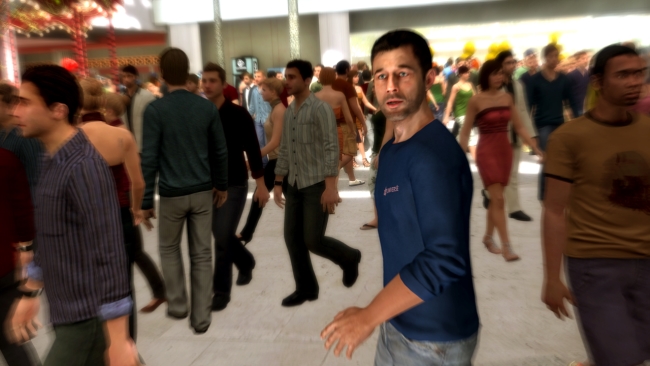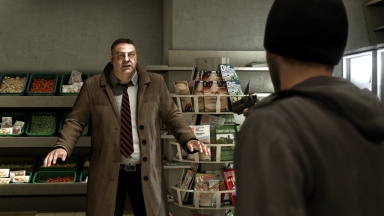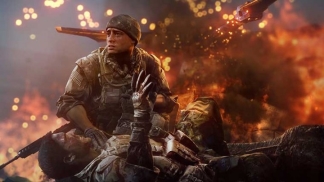Trending
Opinion: How will Project 2025 impact game developers?
The Heritage Foundation's manifesto for the possible next administration could do great harm to many, including large portions of the game development community.

Featured Blog | This community-written post highlights the best of what the game industry has to offer. Read more like it on the Game Developer Blogs or learn how to Submit Your Own Blog Post
Games frequently punish players for losing control in games. But are we missing valuable lessons by not letting go sometimes?

This article originally appeared on dashjump.com.
Heavy Rain
In Heavy Rain, players were faced with scenarios they were frequently unprepared for.Every video game you’ve ever played is about control. If something is even to qualify as a video game as opposed to machinima or animation, there needs to be at least one player, and there needs to be an input mechanism in order to enact agency. In other words, a controller.
But it goes further than just semantics – in order to pass a challenge, to progress to the next level or to master a game, you must demonstrate control over your surroundings. Defeat the boss. Complete the level. Solve the puzzle. Should you fail to control the scenario asked of you, the challenge is reset and you must try again until you dominate the problem with a solution.

More...
Yet in life, we don’t always have control. For the perennially anxious and the control freaks, the benefits of maturity and knowing when to acknowledge when things are beyond our means to control them are critical parts of becoming a well-rounded adult. Games certainly have the power to alter troublesome habits, yet games that aim for a more sophisticated consumer tend to gloss over the massive amount of potential to tap into this rite of passage. Instead, for the most part, would-be ‘mature’ titles ignore these opportunities, preferring to play it safe, passing up chances to give us potentially life-changing lessons.You are punished for losing control in almost every video game you have ever played. Isn’t that interesting?
Pick Any Card (Until You Pick the Right One)
For players, tight controls are always something to be desired, and on a functional level, controls need to be responsive in order to actually play the thing.
However, an interesting thing happens when you compare video games to board and tabletop games. In these types of games, you can constantly find yourself losing control as you’re beset by competing players or environmental obstacles.
Players struck by bad luck, poor strategy or a group of more experienced competitors can quickly find themselves at the mercy of more dominant players – though if the game is well designed, they’ll always have some kind of hope for the tables to turn. For these games, a lack of control isn’t a win/lose condition, but a gradient of experience that changes throughout the course of the game.
Whereas in most video games, these dynamics are usually distilled to a curt summation of whether the player has met the requirements to control a scenario or not. Even in games that incorporate more vague decisions, like traditional RPGs or more action-oriented narrative games like Mass Effect, these more open-ended choices lie outside the context of the main gameplay.
In other words, no matter how you choose to handle a particular dialog sequence, you still have to win all of your battles or your party dies and you have to reload a saved game. The player must be in control in order to play the game as intended.
 Heavy Rain is a notable exception to the trend, allowing players’ decisions to stick with them even if they were ‘wrong.’
Heavy Rain is a notable exception to the trend, allowing players’ decisions to stick with them even if they were ‘wrong.’
Press X to Pull Yourself Together
Rare instances where the player’s control over his character is not guaranteed are worth investigating.
Condemned 2: Bloodshot attempted an interesting wrinkle to this effect. Your character starts the game as a disgraced FBI agent and alcoholic, and as you play, the screen goes blurry and your aim deteriorates unless you drink alcohol pickups to restore your vision. It’s a novel twist, but with only a simple tie-in to the mechanics, the meaning behind it quickly dissipates.
Indie game designer Lars Doucet set out to create this exact kind of experiment with his prototype for Tourette’s Quest, a Zelda-style roguelike where your character experiences Tourette’s symptoms beyond the player’s control. How you choose to handle them – avoiding combat, attempting to suppress oncoming tics – adds another dynamic to what could very well stand in for a typical game experience.
The Walking Dead does an admirable job of playing with the traditional idea of player control. In the game’s chaotic zombie apocalypse setting, while you frequently talk with characters central to the story, you rarely have true control over a situation since characters may react in surprising ways depending on how you interacted with them earlier. Through Telltale’s masterful scripting and mechanics, the game’s world and characters seem to act on their own accord, taking cues from your actions.
Lose Yourself
But what if someone took this idea a step further? What if there was a game where the player’s character himself was paying attention to what the player was doing with him? What if when you did typically playful game actions – jumping or rolling incessantly, running in circles, punching and kicking walls just for fun – the player character was horrified at what you were making him do?
Say you went around jumping off ledges, as is common in third-person action games. What if this gradually hurt your character’s knees, making him more hesitant to jump when you pressed the button?
 What if the player's decisions had potentially traumatic effects on their character?
What if the player's decisions had potentially traumatic effects on their character?
Or how about a strategy game where you play as a commander and you make a wrong decision that gets two of your battleships destroyed. What if your character was haunted by his bad call? What if his sense of guilt affected his judgment enough to cloud his future decisions, making normally distinct unit UI designations seem almost identical to the player?
Or a game where you play as a support character for an AI-controlled protagonist, and you’re tasked with helping them reach their goals and supporting their decisions?
Or a game where you play as an elderly person and your body doesn’t obey you as effectively as you’d like, and only by telling stories from your past to young people can your younger self be summoned as a playable character to accomplish your goals – yet it all relies on the young person paying attention to the story to sustain itself?
Let Go to Continue
The concept of control, of losing it and accepting the loss of it when there is truly no other action to take is an important life skill worthy of exploration in games. The power of agency that this medium offers makes so many potential experiences possible that just couldn’t exist in traditional non-interactive media.
Yet in recent years, our experiments have gotten bolder. The success of Heavy Rain against formidable odds validates the idea that gamers want more evocative experiences that play to more adult sensibilities.
The advent of the Oculus Rift may very well usher in a sub-genre of ‘observer games’ that play up the aspect of watching, of just being in a different kind of space, without having to exert the kind of exacting control over their surroundings and player characters that we’ve come to expect from decades of genre conventions.
Imagine that – a game that you play just by being.
And it all starts with putting the controller down.
Ben Serviss is a co-founder, game designer and producer at NYC indie developer collective Studio Mercato. Follow him on Twitter at @benserviss. |
Read more about:
Featured BlogsYou May Also Like